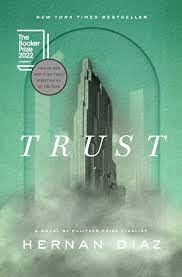Trust, by Hernan Diaz
Made it back from New York City last month with what has to be a new record for me: eight books in my small carry-on duffel bag (our connection was so tight in Paris we dispensed with checked luggage this time around). Despite the fact I told myself I would absolutely not buy another book, each new bookstore proved to be too much of a temptation and I walked out with something, and usually more than one thing, from almost every store we visited. And I’m not talking eight small paperbacks. I have one paperback on writing craft that’s almost 700 pages and two hardbacks in there, including this lovely recipe book on Pierogi (the other is my signed copy of Hernan Diaz’s book, discussed below). My favorite new-find bookstore this time around was Book Culture in Long Island City. Cool place and although I struck out on the grab bag book I bought (just happened to be something I had already read), we ended up going back a second time because we liked it so much. An author event at one of the Brooklyn Public Library branches led to an extremely pleasant evening with Hernan Diaz. My impressions on his novel, Trust, follow but, wow, how exciting to meet him and hear him talk only three and a half weeks before his co-win of the 2023 Pulitzer Prize for Fiction (along with Barbara Kingsolver for Demon Copperhead)!
Meeting Virtual Reader and Writer Friends IRL
Meeting various online reader and writer friends in real life during the week in New York was the highlight, though. The majority of these great readers and writers are people I first connected with during the height of the pandemic. Three years later and many, many book club and crit group sessions later, we were able to connect in person. What fun to explore the city with those who live there, the majority of whom are lifelong residents. Experiences like these are just about the only positive thing to come out of the nightmare of the last three years. If there are other positives, please, fill me in, because maybe I’m missing something in my current glass-half-empty assessment.
Can We Trust Our Impressions?
It’s rare to find a book written at such a high level and so well that flows so easily. I had the impression when I heard Hernan Diaz speak that he had some serious brainpower behind him. I tried to pay attention as much as possible without ruining the experience of reading the book for myself by hearing any spoilers (and there are no spoilers in this blog post). One thing that left a mark on me was how much archival work he does. A lot of research went into the crafting of Trust, and this was something he talked about at his reading. This attention to detail doesn’t weigh the prose down, however. I floated through the first section, an imaginary novel featuring Benjamin Rask and, later, Helen, who becomes his wife, two souls tethered by their love of solitude. What appears to be a non-relationship in fact is a sturdy one, if rather unbalanced in Helen’s favor as she maintains her walled-up existence even as Benjamin learns to discard his in a bid to get closer to Helen. But can we trust our impressions?
Benjamin, already enormously wealthy at the time of his engagement to Helen, becomes exponentially more so during (and possibly as a result of) Black Tuesday. In the end, Benjamin realizes that “he had given life a fair try.”
And so we feel sympathetic toward Benjamin at the end of this section, just in time to reach the second section, a memoir-in-a-novel written from Andrew Bevel’s point of view, which throws everything from the first section on its head. Or does it? After all, the first section is a seemingly fictionalized account of two people in the upper echelons of the New York financial world in the 1920s; the second is a memoir written from the point of view of the supposedly maligned figure upon whom the first section is based.
The book continues in this vein through two more sections, these written from two female points of view. Is the mystery of the first “novel” solved by the end? What’s in a title, or titles, as the case may be?
Lemon Tree Not So Pretty
So…we have a lemon tree not so pretty that I bought maybe five years ago at our local grocery store. I know, I know. That right there sounds like a recipe for horticultural disaster but when I bought it, it actually had a couple of small lemons on it. It has now grown into something of a monster, so much so that we haven’t even moved it out onto the balcony this spring because it’s kind of a pain in the neck (and this is with a rolling pot that we picked up a couple of years ago). Mainly, we don’t want to lose any of the tiny lemons that are trying so hard to survive. Do you know how and when we can prune this tree so that it will be a lemon tree very pretty and potentially grow lemons that resemble, well, actual lemons, and not marbles? I’m at a loss.
Shout Out to Indie Bookstore Libreria Bodoni / Spazio B
I’m a big supporter of indie bookstores, especially those here in Turin where I can find books in English. After Brexit it has gotten increasingly more difficult to find good sources for indie books in English. Shout out to Libreria Bodoni / Spazio B, in the center of Turin at Carlo Alberto 41/g. The link actually goes to another cool indie bookstore business: Bookdealer, which will deliver books to your door. During the pandemic, like many other businesses, bookstores started home delivery and Bookdealer facilitates this service. I’m glad to see they’re still up and running. Libreria Bodoni/ Spazio B is larger than it looks from the outside. They have a wide selection of books and for English and French titles they have magazines; photography books; and a varied and extensive section of fiction and non-fiction titles. The Brillo steel wool totebag got me in the store — their book selection and friendly service will get me to be a regular.
Pulling at Threads is my occasional newsletter. It always accompanies my blog posts but I sometimes send infrequent updates on other goings on. If you want more of an “insider’s” view on what’s happening in my reading and writing life, you can sign up here.


